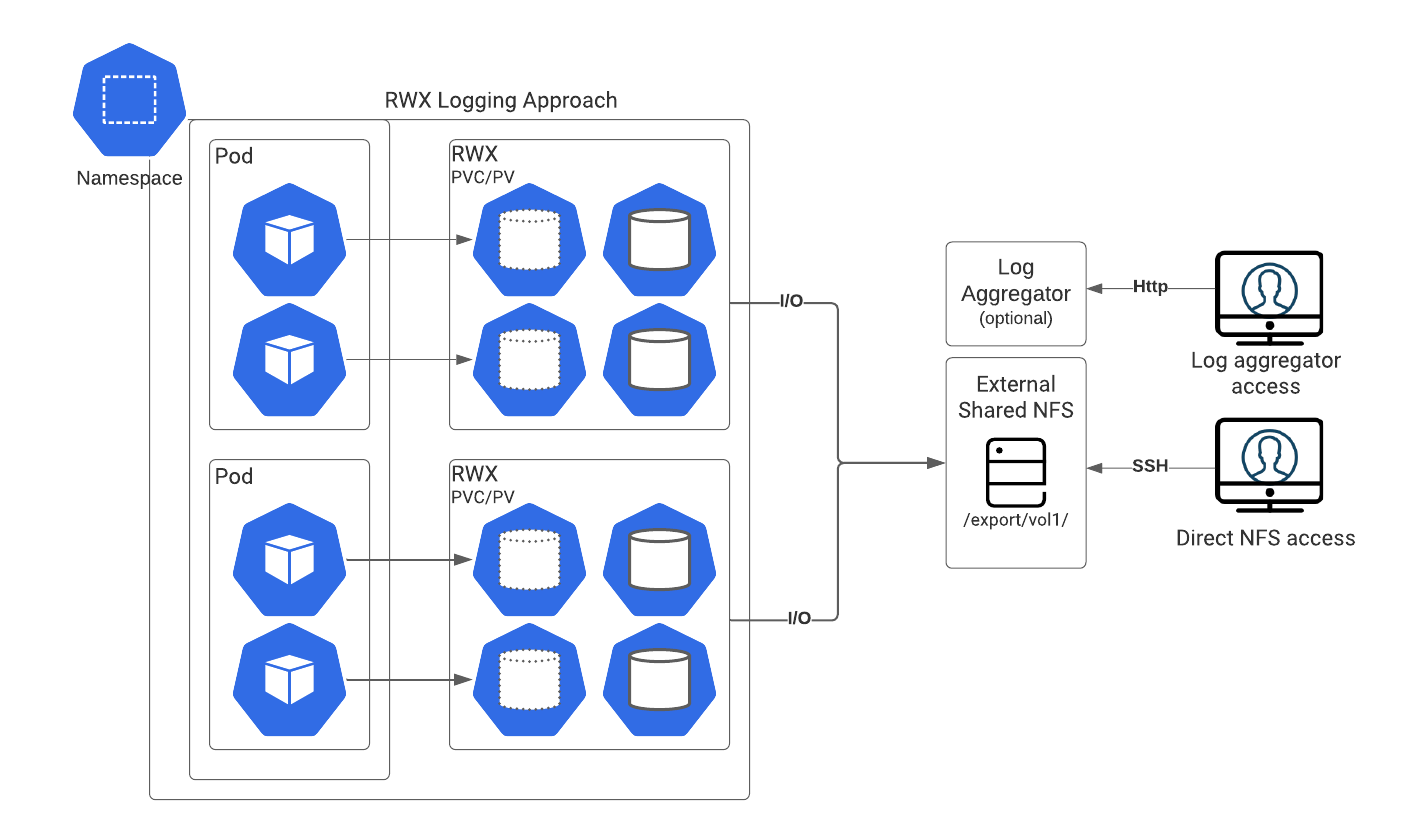RWX logging
Contents
Learn about the legacy logging method of writing logs to an RWX storage such as NFS or NAS server.
RWX logging
Some Genesys Multicloud CX services neither write structured logs in Kubernetes format nor do they write to the stdout/stderr console. These services use RWX logging, which is the legacy logging method of writing logs to an RWX storage such as NFS or NAS server.
Legacy Genesys Multicloud CX applications are not structured to be supported by logging capabilities offered in Kubernetes, nor do they write to sufficient detail in stdout/stderr. To accommodate this type of logging behavior, deployments must be provisioned to support mounting PVC/PV to NFS storage for the application to write its logs. Each Service mounts to its own PV which is backed by an external NFS share. After the logs are written to NFS share, the application controls the size and retention of the file and files can be accessed externally from NFS share directly to package and provide to care.
The method of logging unstructured logs is not suitable for kubernetes-supported logging aggregators such as Elasticsearch.
The sample procedures provided in the following section, help in setting up the RWX storage of your choice.
Services that use the RWX logging approach:
- WebRTC
- GVP
- GCXI
- Voice Microservices
- Genesys Pulse
- Interaction Server
- Tenant Services
Storage Prerequisites
Direct NFS Persistent Storage
With Direct NFS approach, shares are mounted using NFS IP/FQDN and share path is mounted using NFS-subdir-external-provisioner.
For more details about this provisioner, refer to NFS Subdir External Provisioner.
Prerequisite: You must have a dedicated NFS server to create NFS persistent storage.
Create StorageClass for NFS Retained Storage
Here is a sample configuration to create StorageClass for NFS persistent storage. The following configuration is suitable for a bare metal server.
bare-metal-sc.yaml
provisioner: cluster.local/nfs-vce-c00ds-vol1-nfs-subdir-external-provisioner mountOptions: - nfsvers=3 - uid=500 - gid=500 parameters: archiveOnDelete: 'false' volumeBindingMode: Immediate metadata name: <Storage-class-name> kind: StorageClass reclaimPolicy: Retain allowVolumeExpansion: true apiVersion: storage.k8s.io/v1
oc apply -f bare-metal-sc.yaml
Create PVC to dynamically create and bind to PV
create-pvc.yaml
apiVersion: v1 kind: PersistentVolumeClaim metadata: name: <service>-pvc namespace: <service> spec: accessModes: - ReadWriteOnce resources: requests: storage: 10Gi storageClassName: <storage-class-name> volumeMode: Filesystem
Azure-Files Persistent Storage for ARO (NFS Backed)
For ARO type deployments you can map NFS directly. Therefore, you can create NFS share within Azure using Azure-files. You need to create storage class of type Azure-Files:
- "recalimPolicy" set to "Retain"
- "parameters" set based on your specific Azure deployment
For more details, refer to:
Create Storage Class for retained Azure-File NFS storage
azure-file-retain-sc.yaml
allowVolumeExpansion: true apiVersion: storage.k8s.io/v1 kind: StorageClass metadata: name: azure-files-retain annotations: description: azure-files-retain provisioner: kubernetes.io/azure-file parameters: location: westus2 skuName: Standard_LRS reclaimPolicy: Retain volumeBindingMode: Immediate
oc apply -f azure-file-retain-sc.yaml
Create PVC to dynamically create and bind to PV
create-pvc.yaml
apiVersion: v1 kind: PersistentVolumeClaim metadata: name: <service>-pvc namespace: <service> spec: accessModes: - ReadWriteOnce resources: requests: storage: 10Gi storageClassName: <azure-files-retain> volumeMode: Filesystem
oc apply -f create-pvc.yaml

